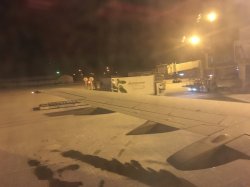jb747
Enthusiast
- Joined
- Mar 9, 2010
- Posts
- 13,504
Do you do anything special around 3 hours in?
Roster myself off for a sleep....
Do you do anything special around 3 hours in?
Bugger on QF72 Sin to Per on 31/12, could have got the 36 but opted for an overnight sleep in Perth insteadLast roster just published.
The trips I have left to do...
QF35 MEL-SIN 30/12
QF36 SIN-MEL 31/12
QF35 MEL-SIN 5/1
QF36 SIN-MEL 6/1
QF35 MEL-SIN 13/1
QF36 SIN-MEL 14/1
QF1 SYD-SIN 20/1
QF1 SIN-LHR 21/1
QF2 LHR-SIN 24/1
QF36 SIN-MEL 27/1
Is there a formal procedure for handing over control to the FO/SO when you go for a nap ?
Is there a formal procedure for handing over control to the FO/SO when you go for a nap ?
Following up my question from July 2016Do you ever become familiar with/ recognise particular controllers? Perhaps at your home port, or for short haul pilots where you might visit a location frequently? I'm thinking particularly of distinct controllers such as Steve Abraham AKA Kennedy Steve at JFK who can be remarkably witty (Google "Kennedy Steve" if unfamiliar)
How formal is it in the flight deck during operations? eg, are you addressed as Captain / Sir, and like wise downwards. When back at the hotel, are you just a group of people recovering in your own ways and 'painting the town together?
Yes JB, agree. I recall as a kid flying out from London to Australia during 1964 on a British Eagle Britannia. Took over three days to arrive in Brisbane after a zig zag trip via various airports. Several unscheduled stops as one engine kept failing. But it was like the pilots and crew all pitched in and were "airmen", rather than the current newer very well trained technicians.They were a different breed.
Is this to prevent HR issues arising? Because your slip times are different? Or some other reason?We never even see the cabin crew on slips...mostly they stay in different hotels.
Is this to prevent HR issues arising? Because your slip times are different? Or some other reason?
Off duty....well I guess that varies across airlines. These days, going your own way is much more common than it was in the past. We never even see the cabin crew on slips...mostly they stay in different hotels.
They were a different breed.
Reading Life in Long Haul had some interesting tales. I felt sorry for the FOs and SOs who probably only wanted to crash but their captains pretty much made it an order that they party on, usually in their rooms, rather than the captains’.
I think that today this would be bullying. But when a senior colleague could determine your promotion prospects I suppose that you’d just have to wear it (and the hangover).
How formal is it in the flight deck during operations? eg, are you addressed as Captain / Sir, and like wise downwards. When back at the hotel, are you just a group of people recovering in your own ways and 'painting the town together?
Previously I have asked the pilots what hours they have flown for the year. Last year JB had logged 875 hours for the rolling year.
What are you all doing this year ?
AFF Supporters can remove this and all advertisements

Under what circumstances is it necessary to de-ice an aircraft before take-off?
So, is this nothing to be worried about or should I add Scat Airlines to my do-not-fly list?
Basically there should be nothing on the upper surface of the wing. A small amount can be present on the lower surface, associated with cold fuel.
On the other hand, they operate in those conditions more often in one month, than I have in a career. Thankfully.

